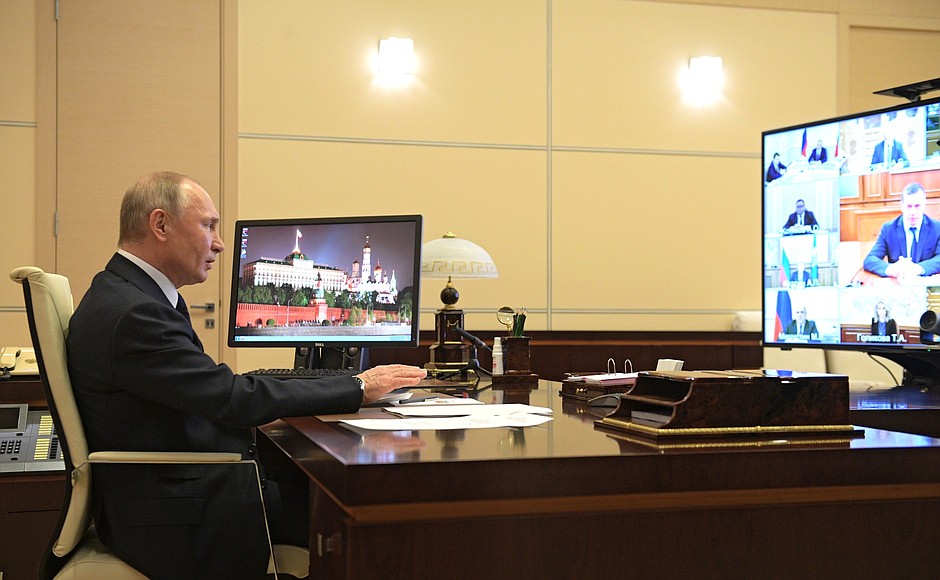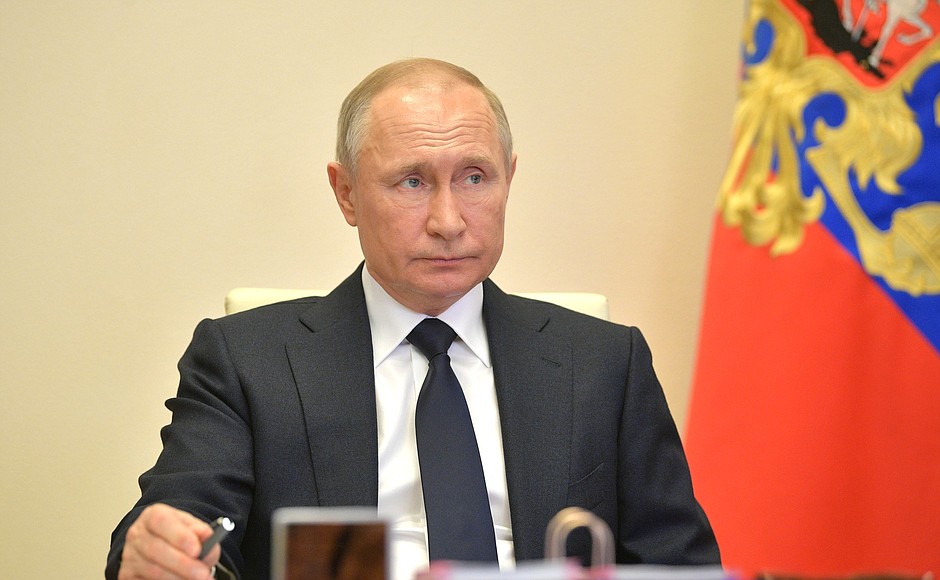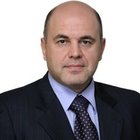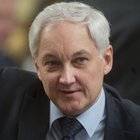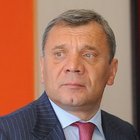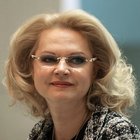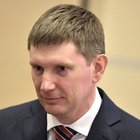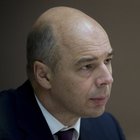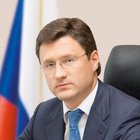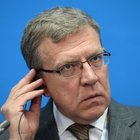Attending the meeting were Prime Minister Mikhail Mishustin, Chief of Staff of the Presidential Executive Office Anton Vaino, First Deputy Prime Minister Andrei Belousov, Deputy Prime Ministers Viktoria Abramchenko, Yury Borisov, Tatyana Golikova, Alexei Overchuk and Dmitry Chernyshenko, Deputy Prime Minister – Chief of the Government Staff Dmitry Grigorenko, Deputy Prime Minister – Presidential Plenipotentiary Envoy to the Far Eastern Federal District Yury Trutnev, Aide to the President Maxim Oreshkin, Economic Development Minister Maxim Reshetnikov, Finance Minister Anton Siluanov, Labour and Social Protection Minister Anton Kotyakov, Industry and Trade Minister Denis Manturov, Energy Minister Alexander Novak and Chairman of the Accounts Chamber Alexei Kudrin.
* * *
President of Russia Vladimir Putin: Good afternoon, colleagues.
Today’s meeting will be devoted to supporting the economy, businesses, employment and people’s incomes amid the fight against the coronavirus epidemic.
The Government has already developed and is implementing a number of measures in this area. At the same time, we agreed to take additional steps as the situation evolves. In this regard, I believe that small and medium-sized companies that trade in non-food products should be added to the list of the most affected sectors, namely small and medium-sized businesses engaged in catering, tourism and hospitality. They also have enough problems now.
Most importantly, I would ask you to include in the programme for supporting the economy and business the following systemic decisions that have been, let me emphasise, coordinated with all departments.
First, I propose providing small and medium-sized companies in the affected sectors – I would like to emphasise, this is in addition to the support measures already taken – direct, free financial assistance from the state. These funds can be used by enterprises to address the current most urgent problems, including paying salaries and maintaining levels for their employees in April and May. The amount of support for a particular company will be calculated taking into account the total number of its employees as of April 1 of the current year, based on the amount of 12,130 rubles per employee per month.
Applying for such aid should be simple and convenient for businesses, with the opportunity to make a request remotely without having to wait in line or be hurried along. Therefore, I ask the Government to make it possible to send such a request within a month, starting May 1.
The only mandatory condition and requirement to a business is that they should hang on to as many jobs as possible – at least 90 percent of the number of staff as of April 1. If this requirement is met, and the Government can check on it, the company in question will receive state financial support for April on its account starting May 18. Correspondingly, funds for May will arrive in June.
Second, the Government has already proposed a programme of interest-free loans for the payment of salaries. Such loans are issued for a term of six months. However, practice has shown that this support measure for the labour market is inefficient. It is difficult to receive a loan, banks are reluctant to accomodate borrowers.
In this context, I believe that Vnesheconombank should guarantee at least 75 percent of such payroll loans. This will make it possible to reduce the risks for commercial banks and, hence, make loans more accessible.
It is also necessary to expand this support measure and allow medium and large companies in the economic sectors that have been hard hit to make use of such loans to enable them not to dismiss their employees or accumulate payroll debt.
Third, regarding core companies, I would like to ask the Government to update the list of these based on clear-cut, objective criteria. The list should include companies that are vital for the entire national economy.
I also propose new special loans for these companies – and a draft Government Resolution already includes over one thousand such companies that form the backbone of the national economy. I am referring to soft loans for floating assets that these companies need for the purchase of raw materials and spare parts and for advance payments to suppliers. Such support will allow these core companies and their partners to continue functioning smoothly. In other words, we will support employment and payroll payments to personnel in the entire cooperation chain.
The rate on these loans will be subsidised by the state at the Bank of Russia’s key rate. So, the real cost of a loan for enterprises today will be 6 percent lower than the current market rate. In addition, half of the loan will have state guarantees under the Ministry of Finance, which will also incentivise banks to issue such loans, minimising the risk for the banking system.
Fourth. I already spoke about the need for additional financial assistance for the regions. Their revenues have decreased for various reasons. However, the regions, where a lot of work is underway to support the economy and the people, are suffering under a heavy load, and the regions must have the necessary resources for this.
Therefore, I propose allocating an additional 200 billion rubles to provide for the sustainability and balance of the regional budgets. Moreover, the regions should have flexibility in using these funds and directing them to implement their own regional measures to support employment and business activity, pay benefits and salaries to state employees, and resolve the most urgent social issues and help people.
Colleagues,
Once again, the situation is changing dynamically. I would ask the Government, together with the regions and the business associations, to continuously evaluate the effectiveness and adequacy of the measures taken. Obviously, updated solutions will be required, both in the economy as a whole and in individual sectors. These decisions need to be worked out now, and the necessary resources should be consolidated. We have spoken about this many times.
Last week, as you may know, we reviewed the situation in the defence industry and the space and rocket industry. Tomorrow we will devote a separate meeting to the construction industry. Shortly, we will discuss measures to support the automotive industry and agriculture, housing and utilities, the light industry, aircraft manufacturing, and other industries.
We know that the airline industry is facing serious difficulties. As an urgent and emergency measure, I consider it necessary to allocate over 23 billion rubles to support air carriers. In particular, these funds will be used to lease equipment, to finance working capital, salaries and to pay for aircraft parking.
In general, I would ask you to quickly work out and submit an action plan, for each of the basic, backbone economic sectors, including support for import substitution in industry.
Let us get down to the agenda. Let us begin with some current issues.
First, I would like to ask Mr Novak, Energy Minister, to report on the talks on the OPEC+ deal and the G20 energy ministers’ meeting.
Mr Novak, please.
Energy Minister Alexander Novak: Thank you.
Mr President, colleagues,
I have to report that the rapid spread of the pandemic and the resolute measures taken by most countries to counter it have led to a sharp decline in economic activity and hence, a drop in the mobility of the population. This has caused a substantial reduction in global demand for oil and petroleum products. In turn, this has called for the adoption of urgent and commensurate measures to decrease market supply with a view to stabilising the global oil market, and preventing overproduction and, in effect, a collapse of the world oil industry.
Given the reduced demand, the current oil surplus is estimated at 15–20 million barrels a day. The decline in demand by the end of the year could average out to about 8 million barrels a day, which is almost 8 percent of the global oil market. Meanwhile, accessible global oil storage facilities will likely reach capacity in the next four to five weeks.
Mr President, following your instructions, we discussed potential measures on a coordinated reduction of supply with oil producing countries. After fairly difficult discussions, 23 countries, including Russia, agreed on joint action, on a voluntary reduction of production over the next two years.
Mr President, allow me to thank you for your personal participation in a series of talks with the leaders of Saudi Arabia and the United States. This made it possible to overcome differences between some parties to the agreement and to reach a practical compromise. I would also like to thank you on behalf of the ministers that took part in the talks for Russia’s leading role in executing the agreement.
As for the parameters of the deal, in accordance with the agreements reached, the production cut in May-June of this year will total 9.7 million barrels per day. This is almost ten percent of global output. Then, production will be gradually restored. From July to December 2020, the cut will amount to 7.7 million barrels per day, and from January 2021 to April 2022, it will be 5.7 million barrels per day. At the same time, the market will be constantly monitored with the possibility of adjusting the deal parameters.
I would also like to emphasise that in addition to the OPEC+ countries that participated in the agreement, about ten more countries announced their readiness to support the efforts to balance the world market.
Last Friday, a meeting of the G20 energy ministers took place with all the ministers participating. Almost all producers, including the United States, Canada, Norway and Brazil, noted solidarity with the efforts of OPEC+ and announced their own cuts.
Thus, in total, producing countries can reduce their daily oil output by about 15–20 million barrels per day in the first months of the agreement. This will mitigate the effects of the reduced demand caused by the novel coronavirus pandemic, stabilise global markets and avoid overstocking and dramatic volatility of oil prices. It will also increase the financial stability of the oil industry and the global economy as a whole.
The current parameters of the agreements fully meet Russia's interests in terms of the effect on the Russian economy and budget.
Mr President, let me also report that the day before yesterday, a videoconference was held with our leading oil-producing companies. The leaders of Russian oil companies fully supported the parameters of the new deal and noted that the market today needs decisive measures to achieve balance.
Despite the current rather complicated situation in the market, fuel and energy companies continue their work to provide the domestic market with oil and petroleum products in full. The Ministry of Energy and the Russian Government will continue to monitor the implementation of the agreements, as well as the situation on the global oil market.
Thank you.
Vladimir Putin: It is important, indeed, that everyone complies with the agreements reached. Of course, we need to be in constant contact with all our colleagues, primarily, of course, with the leading players.
I want to thank you, Mr Novak – I saw you working in this direction – you and all your colleagues. This is a collective result. Thank you very much.
(Addressing Minister of Labour and Social Protection Anton Kotyakov.) Mr Kotyakov, please say a few words about the situation in the labour market.
Minister of Labour and Social Protection Anton Kotyakov: Thank you.
Mr President, colleagues,
There are currently 735,000 unemployed people in the Russian Federation. Since the start of the year, this number has increased by 44,000. At this time last year, employment centers recorded 813,000 jobless people, therefore, information on unemployment that is officially on record excludes the days off work.
To get an objective picture of what is happening in the labour market, we have organised daily online monitoring. We have launched a data collection service on the Work in Russia website. This monitoring includes those who currently work part-time or remotely, and companies’ plans to reduce personnel.
The service now covers almost 100,000 companies that employ over 12 million people or 20 percent of all employed people in the Russian Federation, and they provide current information on their personnel. The incoming data are available by region, industry and core company.
Our current monitoring shows that more and more companies are having their employees work remotely; about 7.5 percent of all employees are working remotely now.
Simplified rules for processing sick leave for employees over 65 were introduced in early April to ensure self-isolation. The Social Insurance Fund receives all the required information directly from employers, without input from the employee. A sick leave certificate is issued remotely for two weeks. An employee will receive payment directly even without waiting for the completion of the sick leave period. Over 530,000 people have already used this opportunity.
Regarding these days off work, we are receiving a lot of questions from employers and employees on how the norms of the labour law are to be applied. We have launched a service for quick consultations at the online platform, онлайнинспекция.рф. As of today, over 70,000 have used the service.
Additional support measures have been introduced for people who are losing their jobs in this situation. The maximum unemployment insurance figure has been increased: it was 8,000 rubles, but now it equals the minimum subsistence level at 12,130 rubles.
Citizens who lost their jobs after March 1 and registered at employment centres as unemployed will receive the maximum amount for the first three months: April, May and June. Those unemployed who have children will also receive 3,000 rubles a month for each underage child.
An online unemployment registration procedure has been introduced. Over 180,000 applications have already been received through this tool. To file an application, it is only necessary to fill in one’s application form and curriculum vitae on the Work in Russia website. No additional certificates are required; all the other information will be obtained through interagency online information exchange.
The parameters used to calculate the average per capita income will be adjusted in order for people who have lost their jobs to use these social support benefits. Employment income received over the previous period is excluded from a household income where there is an unemployed person today. This methodology will be used until the end of the year and will be applied when assigning monthly payments for children aged 3 to 7 as well as payments for the birth of the first and second child, state social benefits and to pay for housing and utility services.
I would like to note that all of these additional measures of support are needed, and the procedure has been simplified as much as possible. For example, as of today, over one million families that are eligible for maternity capital have applied for the monthly payment of 5,000 rubles for each child under 3.
This is all. Thank you.
Vladimir Putin: Mr Kotyakov, how is the Labour Ministry’s 24-hour hotline doing?
Anton Kotyakov: Yes, it is available around the clock. We are receiving about 5,000–6,000 calls and messages. Over 50 operators are working all the time to counsel callers.
In addition, they can send questions in writing to the website онлайнинспекция.рф. A written reply will be sent within three working days.
Vladimir Putin: I would like to ask you to monitor very attentively the observance of the labour rights of the employees that have been told to work from home.
Anton Kotyakov: Got it, Mr President.
Vladimir Putin: Thank you.
Mr Siluanov, please tell us about the additional payment benefits for medical workers and the repayment holidays. How is this organised?
Finance Minister Anton Siluanov: Mr President, colleagues,
First a few words about repayment holidays.
The Federal Law and a Government resolution on repayment holidays were adopted on April 3. They envisage repayment holidays on the following amounts for individuals, self-employed individuals and small- and medium-sized companies: consumer loans of 250,000 rubles and 300,000 rubles for physical persons and self-employed individuals, correspondingly; credit card loans of 100,000 rubles; auto loans of 600,000 rubles; and mortgage loans up to 1.5 million rubles. The latter figure was determined from the very start and is the highest amount.
Even so, under your instructions, we held additional consultations with the Central Bank and the bank community on increasing these threshold figures on mortgage loans.
In line with the Russian Government’s resolutions of April 10 of this year, mortgage loan limits have been raised, that is, a two million ruble loan limit was set for all the regions of the Russian Federation (let me remind you that last year the average mortgage loan stood at 1.5 million rubles), and a 3.5 million ruble limit for Moscow Region, St Petersburg and the Far Eastern Federal District. The mortgage repayment holiday for Moscow is set at a higher level of 4.5 million rubles. Thus, the decision covers practically all mortgage loans on standard housing.
In addition, commercial banks began launching their own restructuring programmes in addition to the government programme to accommodate those who found themselves in dire straits.
In the first week, just two banks – Sberbank and Vneshtorgbank – received over 60,000 applications for repayment holidays, with 70 percent of them submitted remotely. According to the banks, the majority of the applications, over 90 percent, are granted immediately; the remaining ones require additional consultations.
The second question you asked concerns incentive payments.
Vladimir Putin: Mr Siluanov, the matter of the second question is very simple. I voiced the respective numbers – 80,000 rubles of additional payments for medical personnel working with coronavirus patients; 80,000 rubles, 50,000 rubles, 25,000 rubles.
Under the current law, they are subject to personal income tax. But the numbers that were announced are absolute, meaning the amount people take home. It requires amendments to the respective legislation. I ask you to do that.
Anton Siluanov: I see. We will draft such proposals.
Vladmir Putin: Thank you.
And now the main issue of the meeting – the radio electronic industry, the development of the radio electronic industry
<…>
